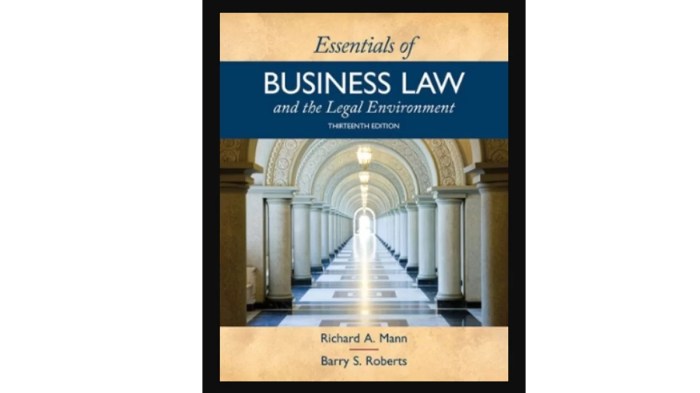Essentials of Business Law 11th Edition presents a comprehensive overview of the fundamental legal principles that govern business transactions and operations. This authoritative text provides a clear and concise explanation of key legal concepts, ensuring a thorough understanding of the legal framework within which businesses operate.
Throughout the book, readers will explore a wide range of topics essential to business law, including contract law, torts, property law, business organizations, employment law, and international business law. With its up-to-date coverage and real-world examples, Essentials of Business Law 11th Edition empowers readers with the knowledge and skills necessary to navigate the legal complexities of the business world.
Contract Law
Contract law governs the formation, interpretation, and enforcement of agreements between parties. A valid contract requires the following elements: offer, acceptance, consideration, capacity, and legality.
Contracts can be classified into several types, including express and implied contracts, bilateral and unilateral contracts, and executory and executed contracts. Contracts are essential in business transactions, as they establish the rights and obligations of the parties involved.
Types of Contracts, Essentials of business law 11th edition
- Express contracts: Contracts that are created through explicit agreement, either written or oral.
- Implied contracts: Contracts that are created through the conduct of the parties, rather than through explicit agreement.
- Bilateral contracts: Contracts that involve mutual promises between the parties.
- Unilateral contracts: Contracts that involve a promise by one party in exchange for an act by the other party.
- Executory contracts: Contracts that have not yet been fully performed by either party.
- Executed contracts: Contracts that have been fully performed by both parties.
Examples of Contract Use in Business
- Sales contracts: Contracts for the sale of goods or services.
- Employment contracts: Contracts between employers and employees.
- Lease contracts: Contracts for the use of property.
- Loan contracts: Contracts for the borrowing and lending of money.
Torts: Essentials Of Business Law 11th Edition

Tort law is the body of law that governs civil wrongs, or torts. Torts are actionable wrongs that result in injury or damage to another person or their property. The purpose of tort law is to provide compensation to victims of tortious conduct and to deter future wrongdoing.
There are various types of torts, including intentional torts, such as assault, battery, and defamation, and unintentional torts, such as negligence and strict liability. Torts can have significant consequences for businesses, as they can result in liability for damages, reputational harm, and loss of business.
Types of Torts
- Intentional torts: Torts that are committed intentionally, such as assault, battery, and defamation.
- Unintentional torts: Torts that are committed without intent, such as negligence and strict liability.
- Negligence: The failure to exercise reasonable care, resulting in injury or damage to another person or their property.
- Strict liability: Liability for an injury or damage that is caused by a product or activity, regardless of whether the defendant was negligent.
Examples of Torts in Business
- Product liability: Liability for injuries or damages caused by defective products.
- Negligence: Liability for injuries or damages caused by the failure to exercise reasonable care, such as in slip-and-fall accidents.
- Defamation: Liability for false statements that damage a person’s reputation.
- Trespass: Liability for unauthorized entry onto or interference with another person’s property.
Property Law

Property law governs the ownership, use, and transfer of property. Property can be classified into two main categories: real property and personal property. Real property includes land and any structures or improvements attached to it, while personal property includes all other forms of property, such as vehicles, furniture, and equipment.
Property owners have certain rights and responsibilities, including the right to possess, use, and dispose of their property, as well as the responsibility to pay taxes and maintain the property. Property law can affect businesses in a variety of ways, such as in the acquisition, use, and disposition of property for business purposes.
Types of Property
- Real property: Land and any structures or improvements attached to it.
- Personal property: All other forms of property, such as vehicles, furniture, and equipment.
Rights and Responsibilities of Property Owners
- Right to possess: The right to occupy and control one’s property.
- Right to use: The right to use one’s property for any lawful purpose.
- Right to dispose: The right to sell, lease, or otherwise transfer one’s property.
- Responsibility to pay taxes: The obligation to pay property taxes on one’s property.
- Responsibility to maintain the property: The obligation to keep one’s property in good repair.
Examples of Property Law in Business
- Commercial leases: Contracts for the use of commercial property, such as office space or retail stores.
- Property acquisitions: The purchase or sale of property for business purposes.
- Property disputes: Disputes over the ownership, use, or transfer of property.
- Zoning laws: Laws that regulate the use of property in specific areas.
Clarifying Questions
What are the key elements of a valid contract?
The key elements of a valid contract include offer, acceptance, consideration, capacity, and legality.
What are the different types of torts?
Torts can be classified into intentional torts, such as assault and battery, and unintentional torts, such as negligence.
What are the rights and responsibilities of property owners?
Property owners have the right to possess, use, and enjoy their property, but they also have the responsibility to maintain their property and avoid causing harm to others.
What are the advantages of forming a corporation?
Advantages of forming a corporation include limited liability for shareholders, tax benefits, and the ability to raise capital more easily.
What are the key provisions of employment law?
Key provisions of employment law include minimum wage laws, overtime pay requirements, and anti-discrimination laws.